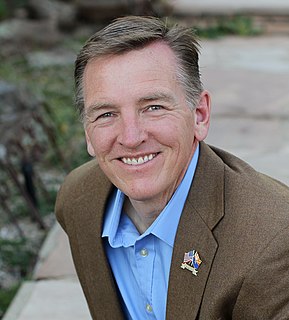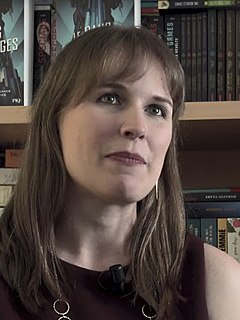A Quote by Paul Gosar
After taking office, I heard from so many constituents who said Kirkpatrick was never available, failed to respond and accomplished nothing of value... Kirkpatrick had her chance, and she blew it.
Related Quotes
What Whitney Houston has accomplished will never be accomplished. She's the most famous person on the planet as far as vocaling and her songs. So I'm very happy that I can sit here and say I had a chance to know her. And I'm still dazed that she's gone. But she lives because her music is so powerful.
Insofar as she recognized at all that she was dreaming, she realized that she must be exploring her subconscious mind. She had heard it said that humans are supposed only to use about a tenth of their brains, and that no one was really clear what the other nine tenths were for, but she had certainly never heard it suggested that they were used for storing penguins.
She came into a room; she stood, as he had often seen her, in a doorway with lots of people round her. But it was Clarissa one remembered. Not that she was striking; not beautiful at all; there was nothing picturesque about her; she never said anything specially clever; there she was however; there she was.
The girl had a certain nobleness of imagination, which rendered her a good many services and played her a great many tricks. She spent half her time in thinking of beauty, bravery, magnanimity; she had a fixed determination to regard the world as a place of brightness, of free expansion, of irresistible action, she thought it would be detestable to be afraid or ashamed. She had an infinite hope that she would never do anything wrong. She had resented so strongly, after discovering them, her mere errors of feeling.
And he absolutely had to find her at once to tell her that he adored her, but the large audience before him separated him from the door, and the notes reaching him through a succession of hands said that she was not available; that she was inaugurating a fire; that she had married an american businessman; that she had become a character in a novel; that she was dead.
My mother lived her life through movies and books - she read everything there was to read. And she read to me every night. I never went to sleep without her reading to me. And she fantasized about the book and she would talk about it, the place, and you would think that after she read the book and after she told you stories about it, that she had actually been there. I learned about story from her, and I learned the value of a great story, and the value of great characters.
You had every right to be. He raised his eyes to look at her and she was suddenly and strangely reminded of being four years old at the beach, crying when the wind came up and blew away the castle she had made. Her mother had told her she could make another one if she liked, but it hadn't stopped her crying because what she had thought was permanent was not permanent after all, but only made out of sand that vanished at the touch of wind and water.
"She (Minnie Ruth Solomon) was unusual because even though I knew her family was as poor as ours, nothing she said or did seemed touched by that. Or by prejudice. Or by anything the world said or did. It was as if she had something inside her that somehow made all that not count. I fell in love with her some the first time we ever talked, and a little bit more every time after that until I thought I couldn't love her more than I did. And when I felt that way, I asked her to marry me . . . and she said she would."
I love my mother for all the times she said absolutely nothing.... Thinking back on it all, it must have been the most difficult part of mothering she ever had to do: knowing the outcome, yet feeling she had no right to keep me from charting my own path. I thank her for all her virtues, but mostly for never once having said, "I told you so.
She often spoke to falling seeds and said, "Ah hope you fall on soft ground," because she had heard seeds saying that to each other as they passed. The familiar people and things had failed her so she hung over the gate and looked up the road towards way off. She knew now that marriage did not make love. Janie's first dream was dead, so she became a woman.


































